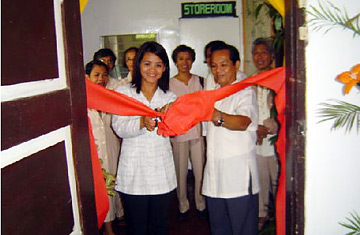
Thelma Unite at the ribbon cutting at the opening of the Ballesteros Public Library, 2005.
"I have a beautiful imagination," beams Thelma Unite [prounounced YOO-NEE-TAY], eyes shining as a broad smile curls across her face. Even then, her presence in this swank coffee shop in Stanley, a ritzy beachside Hong Kong neighborhood marked by flashy cars and exclusive country clubs, would have been hard to envision amid the squalor and deprivation of her native village in Cagayan province, northern Philippines. But Unite, a self-taught artist and singer-songwriter, knows better than most how closely the two places are linked.
Like 250,000 other Filipinas in Hong Kong, Unite is a domestic worker. She arrived here in 1996, young but toughened by 21 years of struggle and hardship. And her story since then is that of an entire generation of impoverished, migrant Filipinos, hailed the "modern heroes" of a nation unable to provide jobs for them at home, and utterly dependent on the billions of dollars in remittances they send back each year.
Yet while Filipina domestic workers are both the anchors of Hong Kong's affluent, high-rolling families as well as the lifeblood of whole communities back home, here they remain largely invisible, cooped up in the apartments of their employers and cut off from their relatives and friends across the seas. They are subject to far stricter employment laws than the rest of the Hong Kong population and are vulnerable to abuse and prone to depression. "I've been through a lot," says Unite, clutching a copy of The Measure of a Man, the spiritual autobiography of pioneering African-American actor Sidney Poitier. "But I still am inspired by so much. I still believe, I still dream."
She does much more than dream. Lucky enough to have supportive employers who gave her the freedom to pursue her interests, Unite not only released a studio-produced album of her own feel-good and catchy ballads in Tagalog and English last year; she even managed to establish a charity that has donated thousands of books and used computers to rural schools around her home town of Ballesteros. Starting from scratch, on her days off, she mustered funds and volunteers from across Hong Kong's social strata. "At first," she remembers, "people would ask me, 'What are you doing, thinking you're so big? You're just a helper.' But I kept faith and I keep trying."
Last Sunday, the government-sanctioned day of rest for domestic workers, she pulled off her biggest coup yet. With 13 other Filipino women, Unite starred in Hong Kong's first ever play by domestic workers about domestic workers. The production, staged and directed by a volunteer crew of professional dramaturgs, was slick and effective, weaving skits, video interviews and monologues into a very human tale of the migrant domestic workers' plight.
As a packed audience of wealthy expatriates, bankers and journalists — as well as other domestic workers — looked on, Thelma and her fellow thespians grappled with the burden of their sacrifice. In previous lives, many were schoolteachers, beauty contestants and union organizers, but now they toil around the clock, rushing after spoiled kids and reckoning with deadbeat husbands. An estimated one-third of the Filipinas working as domestic servants in Hong Kong are university graduates. "What good has that done me?" demands one cast member. "I am just scrubbing toilets."
But, as another points out in a later scene, "each teardrop is worth a dollar." Servants of globalization, these indomitable women enrich the lives of countless others. Thelma, though, will never resign herself to being "just a helper." Sparkling and confident on stage, she declares toward the end of the performance that "Hong Kong is just a stepping-stone. We must use it to power our passion." The play's significant proceeds will go toward constructing fully equipped reading corners for children in Ballesteros, something Unite yearned for when growing up. Her dreams are no longer just beautiful — they're real.
